
OR
Opinion

The first casualty of the war is our foreign policy
More than 260,000 Nepalese currently work in Qatar alone. A slight diplomatic slip with Qatar, which is reported to house Hamas HQ, means a foreign policy and economic disaster in Nepal.
Geo-physically speaking, Nepal and the Middle-East (ME) are situated poles apart. Yet the repercussions of the Israel-Hamas/Palestine war, triggered by Hamas invasion of Israel on October 7, are being clearly felt in Nepal.
In fact, the war is reverberating all over the world. In a way, the global population is divided in favor and against Israel and Palestine causes.
The middle-East war has been an intractable one. The Sherpas of the Camp David Summit, in the late 1970s, that once produced brilliant ideas on negotiation and conflict resolutions in the form of Harvard Negotiation Project, may be mulling over their ideas and theories. Who knows new ideas on conflict resolutions may be in the offing?
Experts agree that there are no military solutions to the problem. Israel may have a military superiority in the air, land and sea but Hamas’ deep underground tunnels, stretching hundreds of kilometers that can be crossed riding motorbikes in the Gaza strip may have baffled Israel army from taking immediate land invasion. In spite of expiry of a 24 hour ultimatum, extended by six more hours, to evacuate millions of population in the North of Gaza strip to the South, Israel Defense Force (IDF) has refrained from invading Gaza strip. Who knows they might be waiting for relief operations or a possibility of exchanging hostages or deterred by global anguish over their retaliatory bombardment of Gaza city? Iran is already threatening to take counter action if ever they make a land invasion into the Gaza strip. It is not even sure what they will do after taking over the Gaza strip.
As reported in the media, out of 17 Nepali students, doing intern with Kibbutz Alumim, located in southern Israel, ten of them have been killed, one gone missing, four injured as a result of the invasion. With the pouring of public outcry, the government of Nepal has been forced to airlift the stranded Nepalis. So far, 254 Nepalese have been rescued, excluding18 more students airlifted by India. The bodies of the four students have also arrived in Kathmandu. The rescue operation is nothing compared to 4,500 Nepali citizens working as caregivers in Israel.
The pervasiveness of Nepali diaspora, as a result of growing foreign employment business and foreign study trips, have almost made it normal for Nepal to be squeezed between the conflicts taking place anywhere in the world. This is true whether it is the Ukraine-Russia war or in the case of Afghanistan.
Obviously, the first casualty of the war is our foreign policy. The government’s implied stand is with Israel. Since 1960, Israel has been a good friend of Nepal. In fact, Nepal is the first Asian country to recognize Israel as a legitimate state. However, there is growing public concerns over collective punishment and genocide, particularly of the women and children, perpetrated by the Israel’s counter offensive actions. On October 21, some members of the civil society and opposition party members organized a protest program in front of the Israel Embassy in Kathmandu, against the ongoing genocide in the Gaza Strip. Clearly, as in other countries, public opinion is divided in Nepal as well.
With BJP and its government in India taking a stand with Israel, the government in Nepal has little maneuvering to do. Moreover, with the condescending attitude of China towards the Palestine cause and a call for immediate ceasefire and containment of the hostilities, Nepal’s foreign policy is badly squeezed. At the one end of the spectrum, we have the business of foreign employment interests. One should remember that Israel and Kuwait are the two popular destinations for Nepali domestic workers, that implies primarily women workers besides the whole of the Gulf region as a major source of foreign employment. The flaring of Israel-Hamas war into neighboring countries and in the Middle-East implies a direct and severe impact on the Nepalese economy. More than 260,000 Nepalese currently work in Qatar alone. A slight diplomatic slip with Qatar, which is reported to house Hamas HQ, means a foreign policy and economic disaster in Nepal.
Equally, Nepal needs to balance its interests with the contending interests of the global and regional super-powers like the USA, EU, China, Russia and India. How Nepal sits uncomfortably with the ongoing war can be observed from the statements made by the Minister for External Affairs and the returnee Nepali student at the airport. In a brief interview, the honorable minister preferred to call Hamas as “terrorists” when the returnee student labeled them as “invaders”. The words carry meaning. Remember during a decade long Maoist war in Nepal, the Chinese media never called them Maoist or PLA fighters, they were called “rebels”.
Much of the inconsistency in our foreign policy emanates from the divergence between “espoused” and “practiced” foreign policies. For long, we have been parroting non-alignment, pancha-sheela, and Birth place of Lord Buddha while at the same time hold official policy to have Nepali citizen joining foreign armies (Gurkha recruitments in British and Indian armies), promotion of foreign employment business and increased dependency on foreign aid and trade. This difference between “saying one thing” and “doing a different thing” has reduced our foreign policy to a sham.
You May Like This

Hamas sources say Israel hostages handed over to Egypt
GAZA STRIP, Palestinian Territories, Nov. 25: Two Hamas sources told AFP that some of the hostages seized in the October... Read More...

Why is Gaza almost always mired in conflict?
GAZA CITY, May 15: The Gaza Strip was pounded this week by hundreds of Israeli strikes from sea, land and... Read More...

Israel, Hamas agree to restore calm in Gaza: Hamas
GAZA , July 21: Hamas said on Saturday it had agreed a truce with Israel in the Gaza Strip, a day... Read More...




Just In
- NEA Provincial Office initiates contract termination process with six companies
- Nepal's ready-made garment exports soar to over 9 billion rupees
- Vote count update: UML candidate continues to maintain lead in Bajhang
- Govt to provide up to Rs 500,000 for building houses affected by natural calamities
- China announces implementation of free visa for Nepali citizens
- NEPSE gains 14.33 points, while daily turnover inclines to Rs 2.68 billion
- Tourists suffer after flight disruption due to adverse weather in Solukhumbu district
- Vote count update: NC maintains lead in Ilam-2















Leave A Comment